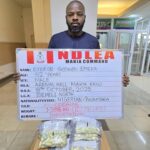By Amofokhai Williams
President Bola Tinubu will depart Abuja on Sunday for Rome, Italy, to participate in the Aqaba Process Heads of State and Government Level Meeting, focusing on the escalating security crisis in West Africa.
The meeting, which begins on October 14, will convene Heads of State, senior intelligence and military officials from African nations, and representatives of intergovernmental organizations to address evolving security challenges in the region.
This diplomatic engagement comes several months after President Tinubu concluded his two-year tenure as the Chairman of the ECOWAS Authority of Heads of State and Government in June 2025.
The Aqaba Process is a counter-terrorism initiative launched by King Abdullah II of Jordan in 2015 and is co-chaired by the Hashemite Kingdom of Jordan and the Italian Government.
The forum recognizes the complex threats facing West Africa, including the expansion of terrorist networks, the growing link between crime and terror, and the convergence of land-based terrorism in the Sahel with maritime piracy in the Gulf of Guinea.
President Tinubu‘s leadership of ECOWAS, which began in July 2023, was marked by significant regional challenges. His tenure concluded with the handover to President Julius Maada Bio of Sierra Leone at the 67th ECOWAS Summit in Abuja.
A key focus of his closing address was on regional security. He expressed concern over the slow pace of activating the ECOWAS Standby Force, a planned military unit designed to intervene in regional crises, and urged fellow leaders to move the force “from concept to operational reality” in the collective fight against terrorism.
During his chairmanship, the region witnessed the exit of three member states—Burkina Faso, Mali, and Niger—which formed their own Alliance of Sahel States (AES), fracturing the regional bloc. At the summit, ECOWAS announced an agreement with the military juntas of these three nations to collaborate in the fight against terrorism, signaling a pragmatic step towards regional cooperation despite political differences.
Presidential spokesman, Bayo Onanuga, in a statement on Saturday, said at the Aqaba meeting in Rome, participants are expected to exchange assessments of the current security landscape and foster collaboration to address cross-border challenges.
He said discussions will also cover strategies to combat online radicalization and disrupt digital networks that facilitate terrorist propaganda and recruitment.
According to him, in addition to attending the plenary sessions, President Tinubu is scheduled to hold bilateral talks with other leaders to explore ways of addressing the rising security challenges across the subregion.
The President is accompanied by a high-level delegation including the Minister of State for Foreign Affairs, Ambassador Bianca Odumegwu-Ojukwu; the Minister of Defence, Mohammed Badaru Abubakar; the National Security Adviser, Nuhu Ribadu; and the Director-General of the National Intelligence Agency (NIA), Ambassador Mohammed Mohammed.







